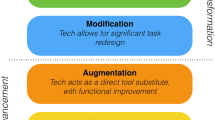Abstract
Assimilation into society via academic achievement is a premise and practice that is universal in schools and school systems. Drawing on the testimonies of technological education teachers and the sociology of knowledge literature, this narrative inquiry research sets the stage for a critical analysis of our reliance on knowledge versus experience in western education policy and planning. A crisp and constructive analysis of the premises school systems take for granted becomes possible, a case for transcending limited ways of thinking about knowledge and experience is made.
Similar content being viewed by others
Notes
In many ways the sociology of knowledge owes its existence to scholars like Marx, Scheler, Mannheim, and Kant. Kant postulated that the human mind possesses categories (e.g., time, space, causality) through which we process our experiences. The sociology of knowledge departs from Kant’s epistemology by focusing upon the society in which an individual lives, and arguing that society also creates mental categories, through the socialization process, which affect our view of the world. The historical antecedents of the sociology of knowledge are an important topic for another paper.
At the core of the sociology of knowledge are four beliefs: (1) An individual’s world view is in part the product of his/her society. (2) These pre-existing beliefs guide the individual as he/she tries to understand the world. (3) This world view is relative to a society’s socio-historical situation, though it appears to the individuals in these societies as natural.
The terms technological studies and technological education are used in Ontario to describe a range of programs including communications, manufacturing, construction, transportation, design, hospitality, and personal services. We refer to teachers in these fields as “technology teachers”.
References
Berger, P. L., & Luckmann, T. (1967). The social construction of reality: A treatise in the sociology of knowledge. New York: Anchor Books.
Bernstein, B. (1970). Education cannot compensate for society. New Society, 387, 344–347.
Boud, D. (1989). Forward. In Susan Warner Weil & Ian McGill (Eds.), Making sense of experiential learning: Diversity in theory and practice. London: Open University Press.
Bowles, S., & Gintis, H. (1976). Schooling in capitalistic America: Educational reform and the contradictions of economic life. New York: Basic Books.
Clark, B. (1968). Educating the expert society. San Francisco: Chandler.
Connelly, F. M., & Clandinin, D. J. (1990). Stories of experience and narrative inquiry. Educational Researcher, 19(5), 2–14.
Crowther, G. (1960). 15 to 18: A report of the central advisory council for education (England) Great Britain ministry of education (The Crowther Report). London: HMSO.
Donaldson, M. (1987). Children’s minds. Glasgow: Fontana Press
Eisner, W. E. (1998). Forms of understanding and the future of educational research. In Ciaran Sugrue (Ed.), Teaching, curriculum and educational research (pp. 161–169). Dublin: St. Patrick’s College.
Gamble, J. (2001). Modelling the invisible: The pedagogy of craft apprenticeship. Studies in Continuing Education, 23(2), 185–200.
Greenfield, T. B. (1993). The man who comes back through the door in the wall: Discovering truth, discovering self, discovering organizations. In T. Greenfield & P. Ribbins (Eds.), Greenfield on educational administration: Towards a humane science (pp. 92–119). London, Routledge.
Hansen, R. (1996). Program equity and the status of technological education: The apologetic nature of technology teachers. Journal of Technology Education, 7(2), 72–78.
Hansen, R., Fliesser, C., Froelich, M., & McClain, J. (1992, June). Teacher development project: Technological education (Final report). London, Ontario: The University of Western Ontario, Faculty of Education.
Harre, R., & Gillett, G. (1994). The discursive mind. London: Sage Publications.
Jones, G. R. (1983). Life history methodology. In G. Morgan (Ed.), Beyond method: Strategies for social research (pp. 147–159). Beverly Hills, CA: Sage Publications.
Karabel, J., & Halsey, A. H. (1977). Educational research: A review and interpretation. In Jerome Karabel & A. H. Halsey (Eds.), Power and ideology in education (pp. 1–85). New York, Oxford University Press.
Kessels, P. A. M., & Korthagen, F. A. J. (1996). The relationship between theory and practice: Back to the classics. Educational Researcher, 25(3), 17–22.
Layton, D. (1993). Technology’s challenge to science education. Buckingham: Open University Press.
McNeil, L. M. (1986). Contradictions of control: School structure and school knowledge. New York: Routledge.
McLaren, P. (1998). Life in schools: An introduction to critical pedagogy in the foundations of education, 3rd ed (pp. 171–198). New York: Longmans.
Sheridan, J. (2000). The silence before drowning in alphabet soup. Canadian Journal of Native Studies, 18(1), 23–32.
Stark, W. (1971). The sociology of knowledge: An essay in aid of deeper understanding of the history of ideas, 4th ed. London: Routledge.
Tripp, D. (1993). Critical incidents in teaching. London: Routledge.
Young, M. F. D. (1971). An approach to the study of curricula as socially organized knowledge. In M.F.D. Young (Ed.), Knowledge and control: New directions for the sociology of education (pp. 19–46). London: Collier-MacMillan Publishers.
Zeichner, K., & Gore, J. (1990). Teacher socialization. In Robert W. Houston (Ed.), Handbook of research on teacher education (pp. 329–348). New York: Routledge.
Author information
Authors and Affiliations
Corresponding author
Rights and permissions
About this article
Cite this article
Hansen, R.E. Program equity issues in schooling: The testimony of technology teachers. Int J Technol Des Educ 18, 189–201 (2008). https://doi.org/10.1007/s10798-006-9022-0
Received:
Accepted:
Published:
Issue Date:
DOI: https://doi.org/10.1007/s10798-006-9022-0




